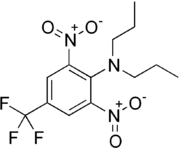Trifluralin (2,6-Dinitro-N,N-dipropyl-4-(trifluoromethyl)aniline) is a pre-emergent herbicide used in landscape beds before the application of mulch (my use for it, anyway). It kills the weeds as they germinate, while not harming most established plants.

From what I understand, the mode of action is as a mitotic inhibitor, which disrupts the microtubules that pull the cell apart when it divides (stops cell division).
How does this only affect germinating weeds, while not noticeably affecting weeds that have emerged from the soil (I have to hit those with another herbicide)?
